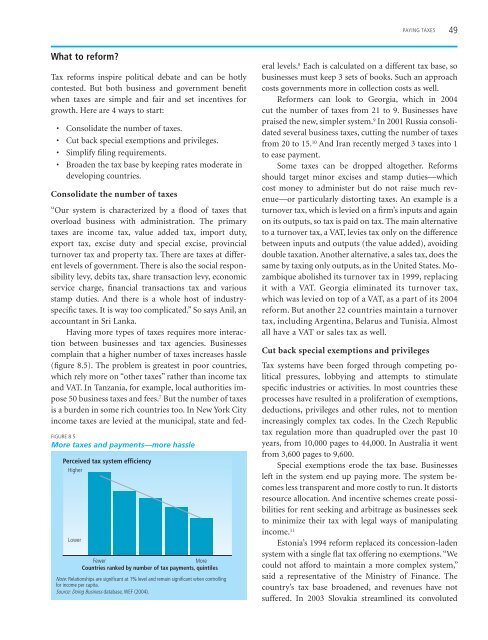Creating
Doing Business in 2006 -- Creating Jobs - Caribbean Elections
Doing Business in 2006 -- Creating Jobs - Caribbean Elections
You also want an ePaper? Increase the reach of your titles
YUMPU automatically turns print PDFs into web optimized ePapers that Google loves.
PAYING TAXES 49<br />
What to reform?<br />
Tax reforms inspire political debate and can be hotly<br />
contested. But both business and government benefit<br />
when taxes are simple and fair and set incentives for<br />
growth. Here are 4 ways to start:<br />
• Consolidate the number of taxes.<br />
• Cut back special exemptions and privileges.<br />
• Simplify filing requirements.<br />
• Broaden the tax base by keeping rates moderate in<br />
developing countries.<br />
Consolidate the number of taxes<br />
<br />
<br />
<br />
<br />
<br />
<br />
<br />
<br />
<br />
<br />
<br />
“Our system is characterized by a flood of taxes that<br />
overload business with administration. The primary<br />
taxes are income tax, value added tax, import duty,<br />
export tax, excise duty and special excise, provincial<br />
turnover tax and property tax. There are taxes at different<br />
levels of government. There is also the social responsibility<br />
levy, debits tax, share transaction levy, economic<br />
service charge, financial transactions tax and various<br />
stamp duties. And there is a whole host of industryspecific<br />
taxes. It is way too complicated.” So says Anil, an<br />
accountant in Sri Lanka.<br />
Having more types of taxes requires more interaction<br />
between businesses and tax agencies. Businesses<br />
complain that a higher number of taxes increases hassle<br />
(figure 8.5). The problem is greatest in poor countries,<br />
which rely more on “other taxes” rather than income tax<br />
and VAT. In Tanzania, for example, local authorities impose<br />
50 business taxes and fees. 7 But the number of taxes<br />
is a burden in some rich countries too. In New York City<br />
income taxes are levied at the municipal, state and federal<br />
levels. 8 Each is calculated on a different tax base, so<br />
businesses must keep 3 sets of books. Such an approach<br />
costs governments more in collection costs as well.<br />
Reformers can look to Georgia, which in 2004<br />
cut the number of taxes from 21 to 9. Businesses have<br />
praised the new, simpler system. 9 In 2001 Russia consolidated<br />
several business taxes, cutting the number of taxes<br />
from 20 to 15. 10 And Iran recently merged 3 taxes into 1<br />
to ease payment.<br />
Some taxes can be dropped altogether. Reforms<br />
should target minor excises and stamp duties—which<br />
cost money to administer but do not raise much revenue—or<br />
particularly distorting taxes. An example is a<br />
turnover tax, which is levied on a firm’s inputs and again<br />
on its outputs, so tax is paid on tax. The main alternative<br />
to a turnover tax, a VAT, levies tax only on the difference<br />
between inputs and outputs (the value added), avoiding<br />
double taxation. Another alternative, a sales tax, does the<br />
same by taxing only outputs, as in the United States. Mozambique<br />
abolished its turnover tax in 1999, replacing<br />
it with a VAT. Georgia eliminated its turnover tax,<br />
which was levied on top of a VAT, as a part of its 2004<br />
reform. But another 22 countries maintain a turnover<br />
tax, including Argentina, Belarus and Tunisia. Almost<br />
all have a VAT or sales tax as well.<br />
Cut back special exemptions and privileges<br />
Tax systems have been forged through competing political<br />
pressures, lobbying and attempts to stimulate<br />
specific industries or activities. In most countries these<br />
processes have resulted in a proliferation of exemptions,<br />
deductions, privileges and other rules, not to mention<br />
increasingly complex tax codes. In the Czech Republic<br />
tax regulation more than quadrupled over the past 10<br />
years, from 10,000 pages to 44,000. In Australia it went<br />
from 3,600 pages to 9,600.<br />
Special exemptions erode the tax base. Businesses<br />
left in the system end up paying more. The system becomes<br />
less transparent and more costly to run. It distorts<br />
resource allocation. And incentive schemes create possibilities<br />
for rent seeking and arbitrage as businesses seek<br />
to minimize their tax with legal ways of manipulating<br />
income. 11<br />
Estonia’s 1994 reform replaced its concession-laden<br />
system with a single flat tax offering no exemptions. “We<br />
could not afford to maintain a more complex system,”<br />
said a representative of the Ministry of Finance. The<br />
country’s tax base broadened, and revenues have not<br />
suffered. In 2003 Slovakia streamlined its convoluted

















